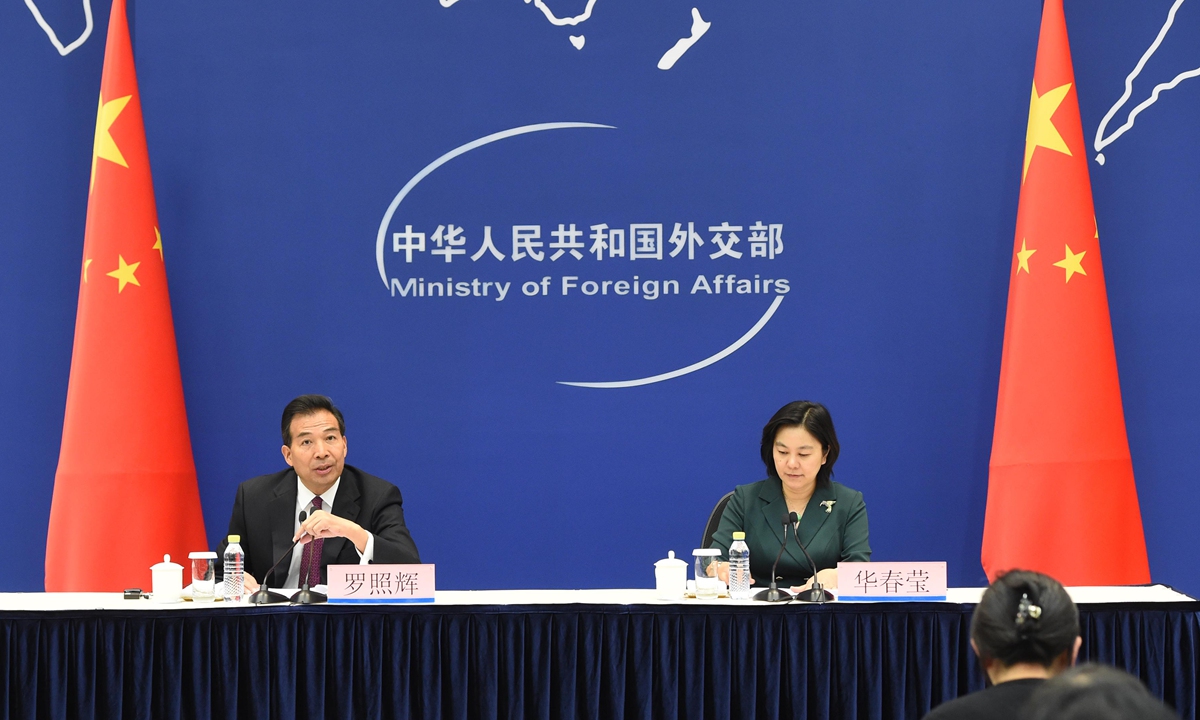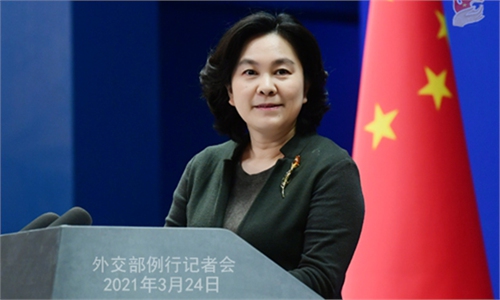IN-DEPTH / IN-DEPTH
China to explore innovation in enhancing discourse power amid US hegemony

Microphone Photo: VCG
China has become more assertive in the international community with a discourse that has evolved, by including diverse tools, aside from the predominant discourse of the West, Chinese observers said after a recent new wave of media allegations about China's "ambitious war" to shape global public opinion.
China's growing narrative capacity in the global arena is reflected in its quicker response and mature strategies, observers highlighted, as they believe China's successful experience in containing the COVID-19 and assistance to other countries in the fight against the epidemic deserve a voice on the global stage. China needs to stand up against the dominant US discourse hegemony which always seek to portray "Chinese stories" with American stereotypes and reproduce a discourse that is aligned with the US narrative.
Experts suggest that the media, politicians, and think tanks, the main forces in China's international public discourse system, should adjust their roles and adopt smarter strategies to cope with soft power attacks from the West, while acknowledging that Western narrative is still dominant.

China's Ministry of Foreign Affairs holds a press briefing on October 9, 2019. Photo: VCG
Breaking hegemony
The recent crusade by foreign media against China's discourse power ambitions in the global arena featured an article by the Associate Press published on May 12 accusing the army of "fake fans boosts China's messaging on Twitter." The New York Times also published a story recently claiming that Beijing is using its global media infrastructure "to seed a positive narrative about China and use tactics as disinformation," based on a report by the International Federation of Journalists based in Brussels.
What these remarks, if not rumors, reflects is an increasing attention to China's strategy, actions and ability to set the agenda as China's influence grows in the international community.
In fact, observers say that China's weight in the international community is rising to levels that are closer to China's comprehensive strength and great power status of, which has accelerated with the quick control over the pandemic and the rapid recovery of the economy.
However, China has been historically relatively weak in international discourse until recent years thanks to efforts to improve the international discourse power as part of a comprehensive foreign policy with Chinese characteristics.
Since the outbreak of the pandemic, China has shared its successful experience in fighting the virus and its active assistance projected a solid image as a major country which earned international praise and gathered wider support to spread its voice.
However, China's image has also been tarnished by the pressure and discourse manipulation from some Western countries, Li Kaisheng, Research Fellow and Deputy Director at the Institute of International Relations of the Shanghai Academy of Social Sciences, told the Global Times on Monday.
Additionally, the changing of the position of the US in the discourse power provides a pathway for China to enhance its international discourse power with a more reliable alternative to "America First" from the US with one that promotes multilateral cooperation mechanisms, defends globalization and advocates for a community with a shared future for mankind, Li suggested.
Martin Jacques, former Senior Fellow at the Department of Politics and International Studies at Cambridge University, told the Global Times that China's rise is in this latest period. Now, China is facing the challenge of negotiating its growing influence in the world as antagonism with the West is growing, which is not because of China's failures but because of its success.
At a press briefing on May 11, Hua Chunying, spokesperson of the Ministry of Foreign Affairs, pointed out that China, as the world's second-largest economy and the largest developing country, deserves to have a voice in global public opinion instead of only hearing the voices from the West, like CNN and the BBC.
The Western discourse hegemony aiming to define China or gagging China to stop it from telling its own story, will not work, Shen Yi, professor at the School of International Relations and Public Affairs of Fudan University, told the Global Times. China's repeated efforts to refute smear by Western politicians and media in the narrative around the pandemic, for example, shows that China is breaking the monopoly of Western discourse and should have a discourse power that is commensurate with its hard power, where there has been a gap of decades now, Shen said.
Smarter strategies needed
China's efforts to increase its discourse power are mainly reflected in two aspects: First, sending a sharp rebuttal against Western prejudices; and second, conveying Chinese perception in diverse ways, observers said.
As the experience managing international public opinion grows, China is now capable of delivering its voice in a faster and more mature way and has even mastered the art of setting the agenda, an essential tool used by many Western politicians.
An example of this is when Zhao Lijian, spokesperson from the Chinese Foreign Ministry tweeted in December 2020 a satirical cartoon by Chinese artist, Wuheqilin, depicting an Australian soldier murdering a child, saying that the Australian government should feel ashamed for murdering Afghan civilians.
The satirical cartoon soon became popular across both Chinese and foreign social media with the public condemning the alleged killing of prisoners and innocent civilians in Afghanistan by Australian soldiers and calling for an investigation into the matter.
Shen believes that China is looking for more flexible and active ways to exert its power in the battle for discourse power because it realizes that the public opinion war is the cheapest way for the West to destabilize China right now.
The rise of China and the relative decline of the West have ignited frustration and conflict in the West but China should not be the scapegoat for their frustration, Shen said.
"That is why China's so-called 'Wolf Warrior Diplomacy,' a term that was initially stigmatized, is now gaining acceptance and even popularity among young Chinese," added Shen.
However, the aggressive tactics used by Chinese diplomats to gain terrain in discourse power are also regarded by some scholars as detrimental for China's long-term image.
Shen believes that the main forces behind China's discourse power, including media, diplomats and the think tanks, should have more specialized functions. Media and think tanks, not diplomats, should work toward setting the agenda and could be at the forefront against Western bias.
The number of think tanks in China has grown rapidly between 2019 and 2020, rising from 507 in 2019 to 1,413 in 2020, an eye-catching 178.7 percent increase. China has overtaken India in the number of think tanks and is now the second country in the world after the US with the most think tanks, according to 2020 Global Go To Think Tank Index Report released by the Think Tank Civil Societies Program (TTCSP) of the University of Pennsylvania. Shen Yi believes that these think tanks should be given full support to play their role of making the world hear the voices from Chinese researchers.
Shen also suggested the launching of cultural products that increase China's soft power and deliver Chinese philosophy and values that are easier to be accepted by audiences from different cultures.
Instead of just lecturing Western audience, Jacques suggested that China should understand where these questions come from and try to respond to them. He noted that it's a very difficult problem to address as understanding of China and of how Chinese governance works is very inadequate in the West.
"Interacting with Western governments is only one dimension. Interacting with Western opinion is also very important," he said.
In the long run, China's advantage in discourse power should not only be built on the basis of counterattacking the discourse hegemony of the West. This kind of thinking is antagonistic and cannot be sustained. China's strategy in discourse power should be based on broader common values and act as a bridge between China and the West, said Li.


